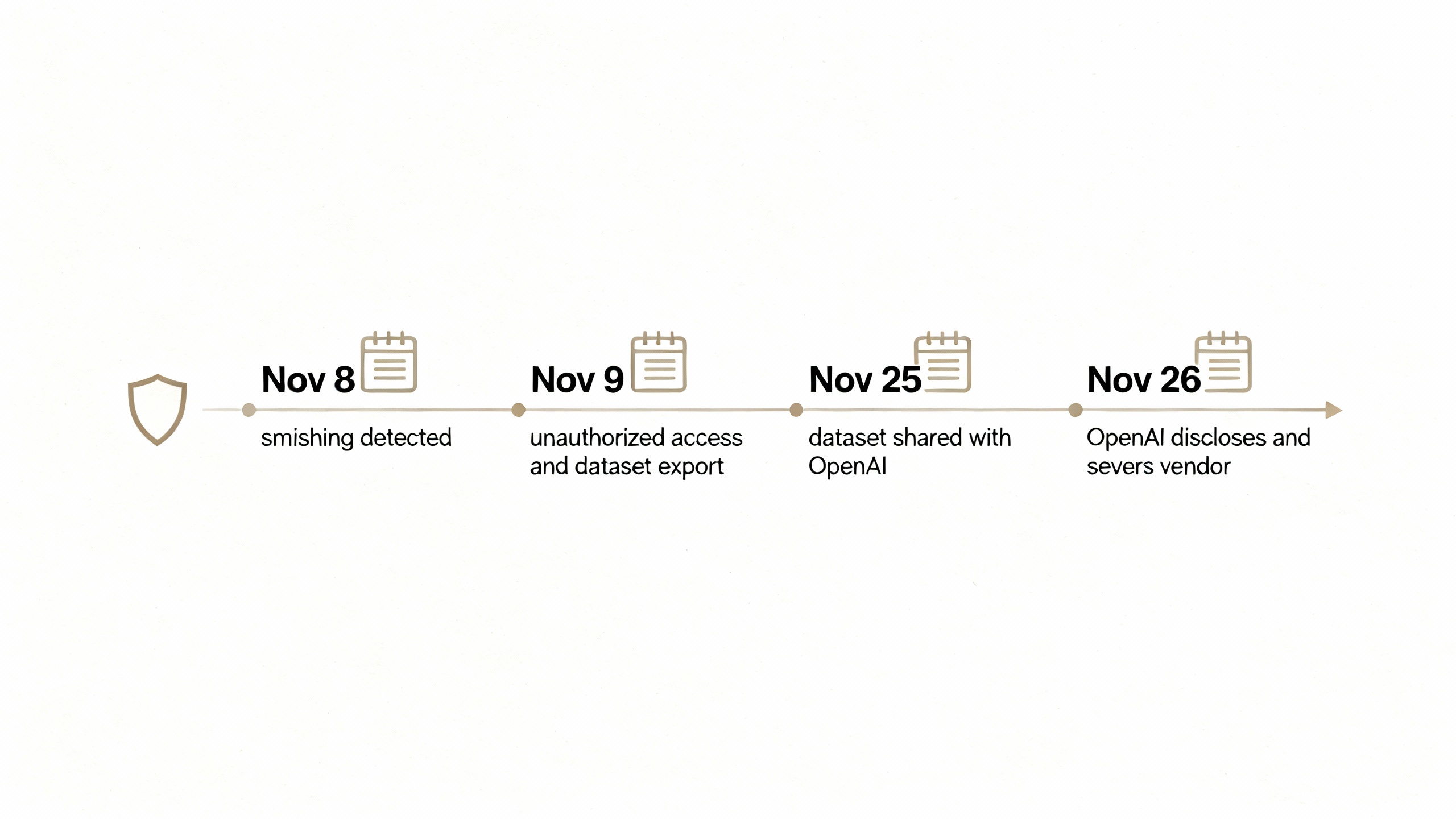What happened, in plain terms
OpenAI says a recent security incident at Mixpanel — the third‑party analytics tool it used on the frontend of its developer platform (platform.openai.com) — exposed limited profile and analytics data for some API users. OpenAI emphasizes it was not a breach of its own systems; ChatGPT consumer accounts and API content (prompts, responses, usage) were not affected. After investigating, OpenAI removed Mixpanel from production and has now terminated its use of the vendor. OpenAI

What data was and wasn’t exposed
OpenAI’s disclosure outlines exactly what may have been in the dataset the attacker exported from Mixpanel’s environment.
Affected vs not affected data (per OpenAI)
| Category | Examples | Status |
|---|---|---|
| Profile & analytics metadata | API account name, email; coarse location (city/state/country); OS & browser; referring websites; organization or user IDs | May have been exposed |
| Credentials & payments | Passwords, API keys, payment details, government IDs, session/auth tokens | Not exposed |
| Product data | Chat content, API requests, responses, usage data | Not exposed |
Source: OpenAI incident FAQ
How the incident unfolded
Mixpanel says the intrusion stemmed from a smishing (SMS‑phishing) campaign it detected on November 8, 2025. OpenAI says Mixpanel became aware that an attacker had gained access on November 9 and later confirmed that a dataset had been exported. Mixpanel shared details of the affected dataset with OpenAI on November 25. OpenAI published its disclosure on November 26 and said it has ended its use of Mixpanel. Mixpanel · OpenAI
- Nov 8, 2025: Mixpanel detects smishing activity. Mixpanel
- Nov 9, 2025: Mixpanel becomes aware of unauthorized access; a dataset is exported. OpenAI
- Nov 25, 2025: Mixpanel provides the affected dataset to OpenAI. OpenAI
- Nov 26, 2025: OpenAI discloses the incident publicly and says it has terminated Mixpanel. OpenAI

Why it matters: vendor risk is now the front line
Even when your own stack is hardened, your risk surface extends to every tool in your pipeline — especially client‑side analytics SDKs that collect identifiers by default. OpenAI’s move to sever Mixpanel is a notable example of vendor off‑ramping after a third‑party event.
Multiple industry reports show supply‑chain and partner incidents rising fast; Verizon’s 2025 DBIR found third‑party involvement in 30% of breaches — roughly double the prior period. That trend, combined with the popularity of AI platforms among developers, makes profile‑level data (names, emails, org IDs) a rich target for social engineering. Verizon DBIR 2025
Independent coverage also notes that while the leaked data is relatively low‑sensitivity, it can still be stitched into credible phishing lures aimed at developer teams. Business Insider · BleepingComputer
What API teams should do now
Building analytics with less risk
You don’t have to choose between visibility and privacy. Teams are increasingly moving to:
- Pseudonymous analytics (no names/emails; hash or map IDs server‑side).
- Privacy‑preserving, self‑hostable tooling for event tracking and dashboards.
- Strict allow‑lists for outbound data fields and referrers.
- “Break‑glass” export controls (human approval + logging for large exports).
These patterns reduce the blast radius when a downstream vendor is targeted, and they align with data‑minimization principles many regulators favor.
The bottom line
This incident didn’t expose OpenAI chats or credentials, but it’s a high‑visibility reminder that developer‑facing analytics can leak just enough context for attackers to level up phishing. OpenAI’s decision to end its Mixpanel usage underscores a broader shift: AI providers are raising the bar for their vendor ecosystems — and builders should do the same for theirs. OpenAI · Mixpanel
Sources
- OpenAI: What to know about a recent Mixpanel security incident
- Mixpanel: Our response to a recent security incident
- Verizon: 2025 Data Breach Investigations Report (news release)
- BleepingComputer: OpenAI discloses API customer data breach via Mixpanel vendor hack
- Business Insider: Hackers stole data from OpenAI’s analytics partner, no ChatGPT users affected




